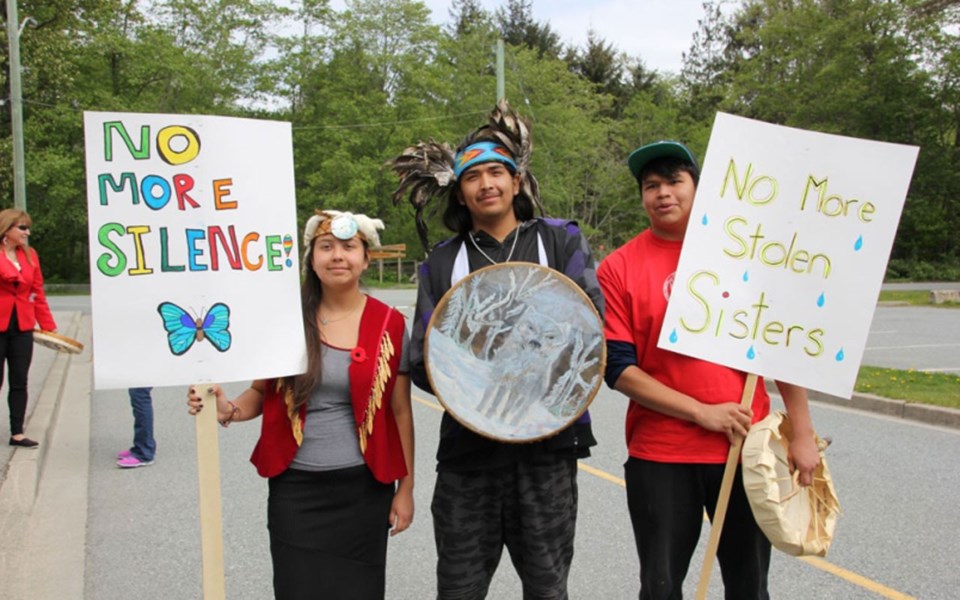As dozens marched past Squamish Elementary, young students ran across the field and raised their hands to thank the marchers. Along the highway, cars honked as they passed. RCMP blocked the intersection to let them cross.
Their handmade signs carried messages that read "No more stolen sisters" and "Justice for Missing and Murdered Indigenous Women."
Drums and signs in hand, students from Pemberton, Whistler and Squamish sang as they marched through town and down the highway. They gathered to call an end to violence against Indigenous women on a highway similar to the very roads many went missing on.
"All of us have been affected," one woman at the march said. "I know many murdered, missing Indigenous women, including my grandmother who was murdered. The case has never been closed."
At the march, women shared other stories of the women and girls they knew who had disappeared. The stories are similar. An Indigenous woman goes missing. If she is found, months or years later, she's already dead. If she is found at all.
When her auntie went missing, Charlene Williams, a culture and language worker with Squamish Nation for the school district, said it plagued her family for the rest of their lives.
"It's something they'll never be able to have closure on. What happened to my auntie who disappeared as a young girl — it's so scary to know as an Aboriginal woman, being a mother, being an auntie, to know if our children, our daughters, our nieces, our sisters, if they go missing are they going to look for them?" she said at the march, with her daughter and niece at her side.
In 2018, the interim report by the National Inquiry into Missing and Murdered Indigenous Women and Girls said nearly 1,200 Indigenous females went missing or were murdered in Canada between 1980 and 2012. In B.C., cases along what is known as the Highway of Tears are still unsolved. Indigenous women across the country are 12 times more likely to experience violence than women of other races.
"Remember, you as a woman have a right not to be violated. We need to end violence against women," one man said at the march. "Look around, you have lots of friends and people here to catch you if you're falling. We're there to catch you and help you back up again."
All the men and boys present raised their hands in a pledge to help and protect women from violence.
Susan Leslie, the district principal of Aboriginal education, raised her hands to the circle of marchers around her.
"The work of the youth, the Aboriginal leadership students in our district, is phenomenal," she said.
Around 60 students from Aboriginal leadership classes in the Sea to Sky school district came together to present to their fellow peers in an assembly at Howe Sound Secondary School on May 3. It began the annual 24-hour drum event, and marked the starting point to the march. At the march's end, a feast, was held at Totem Hall.
Roseanne George, who runs Aboriginal Head Start for families in Squamish, attended the march with other community members. Of the youths' participation, George said, "It means so much, just having no one forgetting our women. That's why I'm shedding a tear, I'm so happy they are here, sharing and remembering. Because it's never over."
To see the original version of this story click here.




